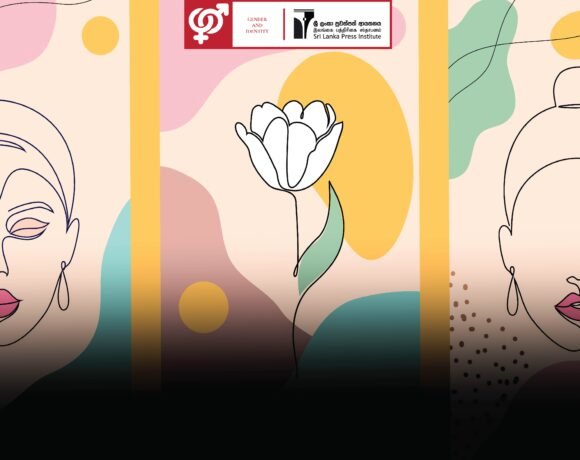
International Day for the Elimination of Violence Against Women
Women : The Odd Piece in Sri Lanka’s Patriarchal Puzzle
Kamanthi Wickramasinghe
When Sirimavo Bandaranaike made headlines as the world’s first female prime minister back in 1960, it was a sudden social step forward that baffled many. Many (mostly men) who thought that women were incapable of doing politics may have felt guilty. Threatened.
Some would have thought that such a progressive step would have made topics such as women’s rights and gender inequality, much easier to be discussed at a decision-making level.
But 61 years later, despite certain advancements in the political sphere, the gender equality situation has worsened, especially in a COVID pandemic era where many females experienced a disproportionate loss of employment, while also experiencing more incidents of domestic violence, rape and abuse.
Poor legal cover
During successive lockdown periods in the ongoing COVID-19 pandemic, incidents of domestic violence, rape and sexual assault have ominously worsened. Women in more vulnerable communities, such as the plantation sector and under-served low-income neighbourhoods in the Colombo metro region suburbs, are among those who face these consequences on almost a daily basis.
In terms of legal protection there exists many grey areas that haven’t been addressed for decades.
A report compiled by the Center for Policy Alternatives titled ‘Legal Reform to Combat Sexual and Gender-Based Violence’ explains how the legal definition of ‘rape’ is narrow in scope in the Sri Lankan context. For example, ‘rape’ is defined as the penile penetration to the vagina and doesn’t include non-consensual acts between heterosexual or same-sex individuals.
Worse, most cases of rape in Sri Lanka are occur with impunity. In 2013 it was reported that 96.5% of men who committed rape faced no legal consequences.
In terms of ‘marital rape’, that is, rape between married individuals, there seems to be no legal culpability at all. Under Sri Lankan law, a man commits rape if he has sexual intercourse with a woman without her consent.
But this doesn’t apply if the woman is his wife, unless they are judicially separated. Therefore, marital rape is not a crime under the Sri Lankan law which is a major gap in the protection of women from sexual and gender-based violence.
Section 364 of the Penal Code lists out punishments for the offense of rape. Conviction could result in a sentence of imprisonment between 7-20 years, which means that the Court cannot give a rapist a sentence less than 7 years.
However, even when cases do go to courts, the delays in Sri Lanka’s legal system often provoked the victim to cohabit with the perpetrator who they may eventually consider as the partner. Long delays in litigation results in situations where the victim is an adult by the time her case reaches trial stage, who may be married with families of their own and will have no interest in continuing the case to prosecute the offense.
However, even when cases do go to courts, the delays in Sri Lanka’s legal system are so long that rape victims live for years even as their molesters continue to remain free. In cases of rape within families and households, the victim is compelled to cohabit with the perpetrator. In a few cases, cultural imperatives compel the victim to even marry their molester to protect the welfare of any children who may result from the rape.
In other situations of the Law’s delays, under-age rape victims may reach adulthood and marry and have their own families and may no longer wish to pursue with litigation, due to social discomfort.
Cyber crimes
In terms of cyber crimes, the situation is much much worse. Not only are women and girls victimized via social media on a daily basis, but officers at dedicated desks established to tackle cyber crimes within law enforcement agencies need further training to professionally respond to these new types of crime.
The law is vague on many counts. Furthermore, community guidelines pertaining to social media platforms don’t favor the victim. There is not enough rigour in the guide lines and inadequate systems of enforcement.
Domestic violence
However, in the case of domestic violence, the situation is different. Even though Violence against Women has been considered a global health issue, it has failed to gain prominence in legal and policy documents.
In the Sri Lankan context, intimate partner violence (both mentally and physically) has been observed as the most perpetrated act. The data coming out indicates worrying trends not in keeping with civilized society.
In their research study titled ‘Factors shaping political priories for violence against women-mitigation polices in Sri Lanka’, Kumudu Wijewardena et al., reveals that the prevalence of intimate partner violence ranges from 20-72% while referring to studies which suggest that 25-35% of women have experienced partner violence in their lifetime.
After several years of lobbying by women’s rights groups, the Prevention of Domestic Violence Act No. 34 of 2005 was passed. However, many citizens seem still of the view that domestic violence is a private matter within the family and a law of this nature would break the sanctity of the family unit.
At the same time, the law itself has flaws. One of the biggest is that it doesn’t provide a comprehensive definition for domestic violence. The Act also does not create a criminal offence for domestic violence.
The focus of the 2005 Act is to protect the victim through protection orders. Since there is no new offence governing domestic violence cases, the existing Penal Code provisions must be relied upon to punish offenders.
However, the criminal justice system has been largely unresponsive towards cases of sexual and gender-based violence. This has had adverse effects on victims who are likely to be dealing with many life consequences physically, mentally and even economically.
Inequality in all its glory
The United Nations Gender Inequality Index ranks Sri Lanka at the 74th position among 187 other countries.
It is correct to say that men continue to dominate almost every industrial sector despite the fact that women comprise 51% of Sri Lanka’s population. The same statistics apply when it comes to politics.
Even though there have been many campaigns to increase the women’s quota in Parliament to 25%, even today, just 12 females have succeeded in securing a seat at the Parliament.
As per Sri Lanka Labour Force Survey (2nd quarter of 2021), the ‘economically inactive’ population is about 8.6 million and of this, 72.9 percent are females.
This was particularly evident in the apparel sector for example where female workers employed in manpower agencies lost their jobs overnight due to the pandemic conditions. With health protocols issued to reduce the work shift cadre, many places of employment had no option but to send a part of their staff home.
In the case of the apparel sector many women are single mothers and sole breadwinners of their families. Rights groups continued to raise their voices against the injustices faced by female garment workers who worked in such dire conditions. These groups point out that workers make every effort to meet their targets and earn a petty allowance but, lack some basic labour rights. Many work without breaks throughout the their shift to ensure that their output targets were met.
Women in other sectors, including agriculture, healthcare and fisheries, face varying consequences. In agriculture, women are losing their primary source of income due to declining farming because of lack of fertilisers. In fisheries, the recent X-Press Pearl ship inferno has caused an ecological crisis along a key stretch of coastline seriously affecting fishing communities.
In the healthcare sector, nurses and female doctors are overwhelmed with pandemic duty demands. Not only is healthcare an ‘essential service’ but the nurses and other medical and administrative cadres are working on the frontlines but lacking sustained infection protection measures.
Women disrespected at the highest levels of the State
Shockingly, even as we mark the international day against Violence Against Women, the nation is reverberating over a controversy about a male parliamentarian committing verbal violence against women in a speech in the House.
Days before the calendar marked the International Day for the Elimination of Violence Against Women, a Government Minister, during a debate in Parliament, the highest, most respected law-making institution of the State, made sexist and derogatory remarks against another sitting female member of Parliament and against the Opposition Leader’s spouse.
What was ironical was a request by another male Parliamentarian that the part of House debate be deleted from the Parliament’s Hansard (the official record). The offensive remarks were made against Samagi Jana Balavegaya MP Rohini Kaviratne and was apparently in response to a speech she made on the Budget for 2022.
In response, the Women Parliamentarian’s Caucus (WPC), that is a bipartisan group, has urged the Speaker to not only take disciplinary action against that Minister but also has asked the Minister to make a public apology regarding the incident.
“There are only 12 female Members of Parliament and we need to increase women’s representation,” opined WPC Chairperson and Government MP, Dr. Sudarshini Fernandopulle in her speech in the House. “People have to respect all women irrespective of party politics. This incident reflects how men think about women at large. All 225 members are born to a mother and they are either married or have a sister. Even though constructive criticism is accepted, passing sexist and derogatory remarks is unacceptable.”
She further said that the behavior of a few Parliamentarians have let down the dignity of the rest of members. “This is where the law is made and it is paramount that educated individuals are elected to represent people.”
The women’s wing of the Samagi Jana Balavegaya, too, has demanded an apology from the Minister. “This shows that they would go to any extent to silence someone who speaks against the government. They may even rape a woman or kill someone,” opined MP Kaviratne.
A darker future ?
Even through President Gotabhaya Rajapaksa’s election manifesto had allocated space for gender equality, elected representatives don’t seem to be following the Executive Head of State or his declared principles.
It is also clear that most cases of domestic violence, rape and sexual abuse are selectively reported in the News media. Sometimes such controversies are used to titillate the audiences in order to tactically distract the public from commenting on other crucial decisions taken in the political sphere.
Rights groups are continuing their efforts to tackle incidents of gender violence, particularly those happening in cyber space. Introducing legal protection for victims of cyber crimes is critical at this juncture.
But the support from the State is paramount to ensure that the law is enforced effectively. Complaints continue to pile up in record books, but many doubt whether a government that failed to separately allocate a Ministry for Women’s Affairs would consider addressing challenges faced by women as a priority during its tenure.








